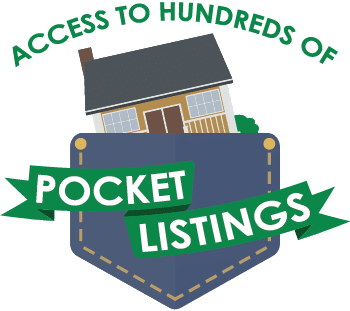Looking for Portland Pocket Listings?

We regularly update our coming soon listings on this website.
I want to make a strong differentiation between coming soon and pocket listings. Pocket listings are generally bad for sellers and bad for the real estate market. Coming soon listings are a “heads up” a notice of a home that is going to be on the market soon but is not yet. Sometimes we use the term “pocket listing” to refer to our coming soon listings because it is a term the public may be more familiar with.
What is a pocket listing?
This is a home a sellers agent has in their back pocket and they are trying to sell this home off the public market. This is typically bad news for the seller because the public market, in almost every instance, obtains the highest and best price for the seller’s home. This is bad news for the Portland real estate market that suffers ever increasing home prices due to a severe lack of inventory (so don’t hold homes back!).
What is a coming soon listing?
This is a home that a sellers agent is going to be putting on the public market in the near future. The sellers agent is promoting the coming soon listing in order to get a full head of steam, generate interest in the property prior to making it available. When I advertise a coming soon listing I advise the seller not to take any offers and potentially not allow any visitors until the home is on the public market. When an interested buyer calls, I let them know when they can see it, when it will be available to the entire public. We typically start our listings on a Thursday and collect offers through Sunday and ask our seller to make a decision on which offer they like on Monday. This is called an “offer window” and it should not be too short (not giving buyers enough time to see it and make an offer) and not too long (if the seller waits more than a few days to respond the buyers will get frustrated and pull their offers).
Why would a seller want a pocket listing?
Privacy. Some sellers have a hard time imagining photos of their home’s interior being blasted out on thousands of websites. Some sellers have a hard time with the general public traipsing through their home on a regular basis. I have solutions for these sellers that are much better than engaging in an off market pocket listing. First of all, we have to take an exterior shot of the home to put it on the public market, but we don’t have to take interior photos. Yes, it helps your home sell to take fantastic professional interior shots (and we almost always do so), but if the seller is really concerned about their privacy, it is not necessary. Second, we can make all offers subject to interior inspection. This means that no buyers get to walk through your home until they make an offer and the seller accepts it. This is a strong protection of privacy. Now, that will also hurt your chances of selling quickly as most buyers want to see inside before making an offer, but you are still going to be exponentially better off being listed on the public market with one exterior photo and no public showings than you would be in a closed off market pocket listing.
Why would a seller’s agent want a pocket listing?
Money. Most commission is split between the buyer’s agent and seller’s agent. For instance, let’s say the commission rate is 6% in a listing contract. (All real estate commissions are negotiable.) In this example contract, the seller’s agent gets 3.5% and the buyer’s agent gets 2.5%. Now let’s say if the agent represents both the buyer and the seller in the example contract, that agent gets the full 6% commission for themselves. (We heavily discount our commission if we represent both sides for a valid reason and I will explain valid reasons for dual representation in a moment.)
Control. Some seller’s agents may only tell their own Realty company about their listings so that Realty company gains a bigger share of the market and they can help out their co-workers.
Cheat the seller. The worst reason imaginable for a pocket listing, and the previous are really bad, goes like this: the real estate agent makes connections with local investors. Those local investors agree to pay the real estate agent a huge “finders fee”, let’s say 10,000 or 20,000 to find them an off market “deal”, a home to either flip or tear down in order to split the lot and build new homes. Then that real estate agent finds a local seller and gets them to agree to sell their home as a “pocket listing” for half the market value or worse. The real estate agent with that pocket listing then “finds” the investor who makes a terrible below market offer on the sellers home and the real estate agent convinces them to accept. Finally, the real estate agent gets the commission on the sale from the seller and a hefty finders fee from the investor on top of it. Big problem – that seller just got taken advantage of. As you might imagine, this is against the Oregon Association of Realtors rules, OAR 863-015-214, the seller’s agent must deal honestly and in good faith and disclose to the seller in a timely manner any conflict of interest, and must be loyal to the seller by not taking action that is adverse or detrimental to the seller’s interest in a transaction.
What are valid reasons for a seller’s agent to represent the buyer (both sides)?
First valid reason, a buyer and seller agree to terms before contacting a real estate agent. They want to do a sale together and are bringing in the real estate agent like a referee, to make sure everyone plays by the rules. Even in this case, the real estate agent should advise the seller of the advantages of going on the public market and do a CMA (comparative market analysis) for the seller to help the seller know that they are engaging in a deal at market value or close to it. Interestingly, not every seller wants market value. Let’s say an uncle wants to sell his home to his niece. It is still important for the real estate agent to educate the uncle as to the home’s market value, but if he wants to sell it for less to a family member, that is the uncle’s right.
Second valid reason, the home has been on the market a while and has not sold. A buyer contacts the seller’s agent and wants to make an offer using the seller’s agent (this is pretty rare anymore, most buyers have their own buyers agent). Before the seller’s agent writes up the offer the agent talks with the seller and gets permission to represent both sides. If the seller does not agree, the seller’s agent refers the buyer to a qualified agent. If the seller agrees and agrees to the offer the seller’s agent can, in Oregon, represent both sides making sure to provide excellent services to both clients. In this dual representation role the seller’s agent cannot tell either party what pricing terms are favorable to the other side.
Our commission rates are reasonable and we put our seller’s interests first!


